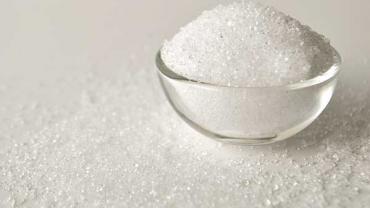
With the popularity of the ketogenic diet exploding, food manufacturers and nutraceutical companies have begun offering several new food products that can make a ketogenic lifestyle not only manageable but also convenient. However, one of the biggest challenges in creating keto-friendly products revolves around crafting a product with palatable sweetness but without the use of sugar or unhealthy, chemically-synthesized sugar substitutes. New sweetening agents are popping up to solve this problem, but most consumers (and many practitioners) are unfamiliar with these new sweeteners. Allulose is one such substance.
A GI-Friendly Sweetener
Allulose is a monosaccharide epimer of fructose, formally called D-psicose. It’s found naturally in jackfruit, figs, raisins, and maple syrup. Humans lack the enzymes to digest allulose, so it is largely excreted. In one study, approximately 90% of ingested allulose was recovered in urine, with 1.79-5.65% recovered in feces. Even more exciting is the fact that allulose does not induce the unpleasant GI effects which are commonly experienced with sugar alcohols due to its low colonic microbial fermentability. This discovery was made in a rat study which measured fermentability using a hydrogen gas breath test and 35 strains of colonic bacteria. In a non-randomized controlled trial, a GI tolerance test for allulose was conducted and no cases of severe diarrhea or GI symptoms were noted until a high dose of 0.5 g/kg of body weight was reached.
Metabolic Effects of Allulose
Allulose is gaining fame as a functional sugar with positive metabolic effects including hypoglycemic, hypolipidemic, and antioxidant activities. Allusose has no impact on blood glucose or insulin levels when consumed in reasonable amounts, is nearly calorie-free, and has been shown to have a small but notable impact on reducing body fat mass. Therefore, it’s an ideal sweetener for those on ketogenic or reduced carb diets.
Allulose not only has no impact on blood glucose and insulin levels, but may actually improve glucose tolerance and insulin sensitivity, as well as reduce adipocyte inflammation. When allulose is included in a meal containing carbohydrates it has been shown to modulate the postprandial glycemic impact of the meal in both healthy and pre-diabetic subjects. In one study, administration of 5g allulose in tea consumed with a mixed meal (425 calories, 84.5g carbohydrate, 13.3g protein, 3.7g fat) resulted in significant decreases in postprandial glucose and glucose area under the curve compared to the control tea (containing 10mg aspartame).
Similar findings were seen in a study of healthy young subjects given various doses of allulose along with 75g of maltodextrin as a beverage. Compared to taking the maltodextrin alone, the elevations in blood glucose and insulin were suppressed with co-ingestion of 5g or 7.5g of allulose, but not with 2.5g. Suppression of insulin is noteworthy, because owing to the prevalence of metabolic syndrome and other hyperinsulinemic conditions, a reduction in glucose levels at the expense of substantially elevated insulin would be undesirable.
The precise mechanisms by which allulose reduces postprandial glucose excursions is not known for certain, but researchers believe it may be due to inhibition of alpha-glucosidase, an intestinal brush border enzyme that breaks down starch and disaccharides into glucose. Another hypothesis is that allulose may promote hepatic uptake of glucose and accumulation of glycogen, increasing glucose tolerance.
Finally, animal studies provide evidence that allulose may have other potentially beneficial effects, such as suppressed activity of hepatic lipogenic enzymes, resulting in reduced abdominal adipose deposition and triglyceride accumulation in the liver.
Individuals embarking on ketogenic and low-carb diets no longer have to be barred from indulging in delicious and convenient treats. On the contrary, allulose is the new kid on the block that shows promise in improving metabolic pathways rather than just preventing a metabolic derailment. Allulose provides a healthy alternative to the sugar alcohols that are notorious for causing GI disruptions, has a pleasant taste and carries more benefits than just sweetness.